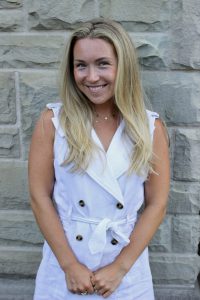Please tell us about your career pathway to date (positions and institutes):
After graduating from my Bachelor of Health Science from Western University in 2018, I jumped right into my Master of Science in Health Promotion. During my Master’s, also at Western, I explored how a childcare-based physical activity and sedentary time policy influenced children’s (<5 years) physical activity levels. I really enjoyed conducting research in the childcare community; this motivated me to begin working on my PhD following my MSc defense. My graduate studies have allowed me to focus on various projects that explore a few areas of children’s physical activity, including children’s outdoor risky play, children’s physical activity levels during and post-COVID, and how physical activity and sedentary time policy can promote children’s healthy movement.
What is your main research interest?
My main research interest lies in promoting children’s health via physical activity. In my personal life, I really enjoy getting outdoors and exploring nature while getting my steps in. I am lucky to be able to combine my personal interests with my research, by primarily focusing on how we can increase children’s health via promoting their physical activity. Since the onset of the COVID-19 pandemic, a lot of research has revealed that many families (including young children) are beginning to use the outdoors as a facilitator for getting active. I think this is a great trend, due to the inexpensive nature of getting active outdoors, and the endless opportunities nature has to offer – including activities such as: hiking, biking, swimming, and rollerblading.
How do you explain your current research/job to friends and family?
With the COVID-19 pandemic present in our lives since 2020, I have had to pivot my research to adapt to the remote working world. With that in mind, when I am explaining my research to friends and family, I tell them that my work focuses on exploring the impact of stay-at-home orders and public health measures (e.g., closures of sport facilities, community centres, and parks) on children’s physical activity experiences. Since many settings that previously supported children’s physical activity have been closed, we need to understand what children and their families have been doing to stay active during these times. I explain that research is an important component of identifying how we can mitigate challenges that parents, and children experience when it comes to physical inactivity, and that I am currently looking at pandemic-related challenges.
What could help you as a student/ECR to further develop/grow in your current position?
I think that just having an understanding that there is always room for growth and improvement is a first step. It is often easy not to prioritize self-growth, because we all have such busy schedules, especially as Masters/PhD students. I think having monthly goals, such as targets to attend webinars or protected time to network with experts or role models, is a great way to develop and grow as an early career researcher.
What are the main barriers you encounter/experience when conducting research, or what information/skills do you lack to conduct high quality research?
I think that funding is a huge barrier when it comes to conducting research. The landscape for securing research funds is more competitive now than ever, and funding is important for research activities such as: paying qualified research staff, providing tokens of appreciation (e.g., gift cards) for research participants, and software’s for analyzing data. When you have a lot of projects that you want to run, and that sound great on paper, not having funding can make it difficult to see them through until the end.
What do you think will be the next most important development in the nutrition and/or physical activity field?
I think the next most important development in the physical activity and nutrition field will be a focus on moving away from a “one size fits all” approach. I think that a lot of health interventions, including nutrition and physical activity ones, tend to prescribe the same components on all participants. I think it is important that we consider personal differences (e.g., preferences for different types of foods, preferences for different types of sports and physical activities), and tailor solutions based on individual needs. What if someone likes swimming, but doesn’t like running? Shouldn’t we let them do what they like and reap the benefits of that?!
Given unlimited funding, what would your dream research project be?
To travel around and explore how children’s physical activity levels vary based on climate. I think that as a person who has lived in Canada with harsh winters my whole life, we often hear about the barriers that inclement weather (extreme cold, rain, snow) has on our ability to get active. Given this, I would be very interested to observe how geographical location changes our activity patterns. Specifically, what changes would occur in someone moving from a 4-season country to a country with a warmer climate year-round
Contact
If you would like to get in touch with me, you can email me anytime at mszpuna@uwo.ca. In addition, my Twitter handle is monika_szpunar.


